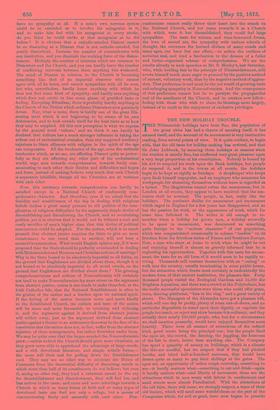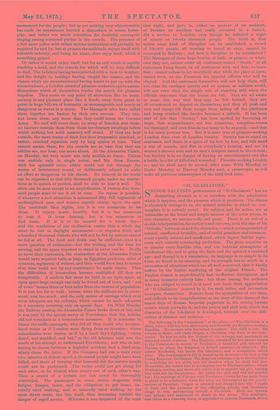THE NEW HOLIDAY TROUBLE.
THE Whitsuntide holidays have been fine, the population of the great cities has had a chance of amusing itself, it has amused itself, and the account of its amusement is very instructive reading, from several points of view. It is quite evident, to begin with, that the old taste for holiday-making has revived, and that Sir John Lubbock, by securing three holidays at seasons when the weather is usually fine, has conferred very great pleasure upon a very large proportion of his countrymen. Nobody is bound by his Act to suspend his work upon the Bank holidays, but people do suspend it, and in the towns at all events, the holidays begin to be kept as rigidly as Sundays. A shopkeeper who keeps open finds himself unpopular, and an employer who summons his workpeople for absenting themselves without leave is regarded as a tyrant. The Magistrates cannot refuse the summonses, but in LondOn at all events, they appear to have resolved that the sen- tences shall be nominal. The people, in fact, really like the holidays. The puritanic dislike for amusement qua amusement which raged in England for a few years has disappeared, and so has the passion for work, or the appearance of work, which for some time followed it. The writer is old enough to re- member when a holiday for grown men, a holiday avowedly to be spent in amusement, was denounced as something quite foreign to the "serious character" of our population, which was congratulated occasionally in solemn "leaders" on its freedom from the frivolous tastes of France and Southern Europe. Now, a man who stays at home to work when he might be out and enjoying himself is almost as gravely informed that he is neglecting his opportunities. Together with this taste for amuse- ment, the taste for an old form of it would seem to be rapidly re- viving. Thousands still content themselves with an "outing" or walk into the country, usually terminating in some public-house, but the attraction which draws most certainly is undoubtedly the modern form of that ancient institution, the pleasure-fair. Forty thousand people visited the Zoological Gardens and 14,000 the Brighton Aquarium, and there was a crowd at the Polytechnic, but the really successful speculators were those who could offer grass, trees, dancing-platforms, "kiss in the ring," and a great variety of shows. The Managers of the Alexandra have got a pleasant hill, which will one day be pretty, plenty of room ont-of-doors, and no particular disposition to stand upon their dignity, or regulate the people too much, or reject any show because it is ordinary, and they actually drew nearly 100,000 people, who, but for a circumstance we shall mention presently, would have enjoyed themselves most heartily. There were all manner of attractions of the refined kind, good music being the principal one; but the people liked the open air, the crowd, the dancing, the juggling, the humours of the fair in short, better than anything else. The Company has spent a quantity of money on buildings, which in a climate like this are needful, but we suspect that if they had pitched booths, and hired half-a-hundred caravans, they would have drawn quite as many to pay their shillings at the gates. The open air, an opportunity of rather rough courtship, something to see—it hardly matters what—something to eat and drink—again it hardly matters what—and liberty of movement, these are the attractions which to men weary with labour in confinement and amid streets seem almost ParadisaicaL With the attractions of the old fairs, there will come, we strongly suspect, a trace of their old licence, which will need some watchfulness on the part of the Companies which, for evil or good, have now begun to provide amusement for the people; but as yet nothing very objectionable has made its appearance beyond a disposition to coarse horse- play, and rather too much toleration for doubtful extempore singing among scattered parties in the crowds. The presence of a few more police with rather stricter instructions will probably be required by and by, but at present the multitude enjoys itself with tolerable sobriety, and being let alone, does enjoy itself, which is something gained.
Or rather it would enjoy itself, but for an evil which is rapidly reaching a head, and the remedy for which will be very difficult to find. The holidays having been selected with a view to weather, and the delight in holidays having caught the masses, and the classes which are inconvenienced having learnt to put up with the inconvenience, a London crowd of pleasure-seekers is apt to assume dimensions which of themselves render the search for pleasure hopeless. They move on any point of attraction like an army, encamp in any pleasant place like a horde, sway from point to point in huge billows of humanity, as unmanageable and nearly as dangerous as waves in a storm. The Managers who have called them together are beaten by their own success. They can- not house them, any more than they could house the German Army. No roof will cover them, no array of benches seat them, no barriers restrain them from those involuntary swayings before which nothing but solid masonry will stand. If they are kept outside, the mere tramp of their feet does irreparable mischief, or rather, mischief reparable only by long spaces of time. They cannot amuse them,, for the crowds are so vast that they can neither see, nor hear, nor move about. At the Alexandra Palace, on Monday, the very music' was only audible at times ; Titiens was audible only in single notes, and Mr. Sims Reeves, with his splendid voice, either could not cut through the waves of involuntary sound, or deliberately refused to make an effort so dangerous to his throat, No concert in the world -can be organised so that fifty thousand people, under no restric- tions as to speech or motion, shall be able to hear it well. No show can be seen except in an amphitheatre, if twenty-five thou- sand people want to see it all at once. No repose is possible, if whenever a new attraction is announced fifty full regiments of .undisciplined men and women eagerly charge upon the spot. The multitude likes sights, but it is too numerous to see them. It enjoys music heartily, but it is too numerous to hear it. It loves dancing, but is too numerous to find room. If it is to be amused for a whole day— and the conditions of our civilisation ensure that a whole day must be lost in daylight amusement —it requires food, and a hundred thousand visitors who will not be fed by rations cannot be fed at all. The food and drink may be sufficient—that is a mere question of arithmetic—but the waiting, and the time for serving, and the space required to stand in never can be. Really to serve their customers, the contractors at the Alexandra Palace would have required balls as large as Egyptian porticoes, miles of counters, regiments of waiters, and then would have had to mourn that time could not by any contrivance be made elastic. Then the difficulties of locomotion become multiplied till they are insuperable. A modern fair must be held in an open space, an open space large enough can only be found out of town, and " out of town" means three or four miles from the centres of population. It is just too far to walk ; horses, when the millions are in move- ment, cost too much ; and the only means of carriage which even seem adequate are the railways, which cannot be made adequate to a necessity recurring only on special days. On Whit Monday the Railway passing the Alexandra Palace broke down at last, and it was only by the special mercy of Providence that the holiday did not terminate in a tremendous massacre. It is nonsense to blame the traffic-managers, who did all they could, who accumu- lated trains as if London were flying from an invasion ; whose subordinates were beaten as if by a hard day's fighting, " clean dazed, and muddled, and bet," as the old labourer said was the result of his attempt to understand Providence; and who at last, having to choose between a frightful accident and a dead-stop, wisely chose the latter. If the Company had run a train every 'two minutes at decent speed, a thousand people might have been killed, and short of running that immoral risk the service simply could not be performed. The trains could not get along for each other, or be cleared when empty out of each other's way. Then a crowd of a certain size can never be thoroughly controlled. The passengers in some trains, desperate with fatigue, hunger, thirst, and the obligation to get home, na- turally tried walking, and as naturally tried walking by the most direct route, the line itself, thus increasing tenfold the danger of rapid service. Whoever it was despaired of the work that night, and gave in, either on pretext of an accident, or because an accident had really occurred in a tunnel, did a service to London, even though he inflicted a night of misery on twenty thousand people. The truth is, that unless some kind of discipline can be established, a crowd of 100,000 people, all wanting to travel at once, cannot be conveyed by Railway ; and how is discipline to be established ? The Managers of these huge booths, or halls, or palaces, or what- ever they are, cannot order all customers named " Smith," or all customers living South. or all customers with red hair, to leave first ; cannot refuse to let everybody stay while the place is open, cannot even, as the Foresters do, appoint officers who will be obeyed. And the customers themselves will not help them, will not cram the carriages quietly and on system as soldiers would, will not even obey the simple rule of standing still when the officials announce that the trains are full. They are all aware in some dim way that they may be left behind, they are all accustomed to depend on themselves, and they all push and rush and charge till their escape from falling oil the platforms and being crushed like beetles becomes a miracle. It has been said of late that "Society" has been spoiled by becoming so large, that acquaintances are too numerous, reception-rooms too thronged, and even friends too many to be enjoyed,—and that is for many persons true. But it is more true of pleasure-seeking London than even of London Society. Society has to stand on staircases, and dance in a space of six feet by four, and talk amid a war of sounds, and flirt in everybody's hearing, and see its women's dresses torn and its men's tempers raised to blood-heat; but Society is in no danger of having an entertainment end like a battle, in a list of killed and wounded. Pleasure-seeking London is ; and we shall have to record, after some Whit Monday, or Easter Monday, or Harvest Monday such a catastrophe as will make all previous catastrophes of the kind look tame.



































 Previous page
Previous page